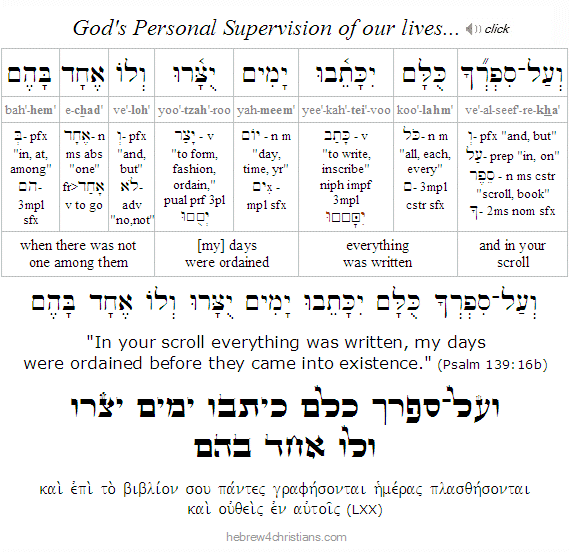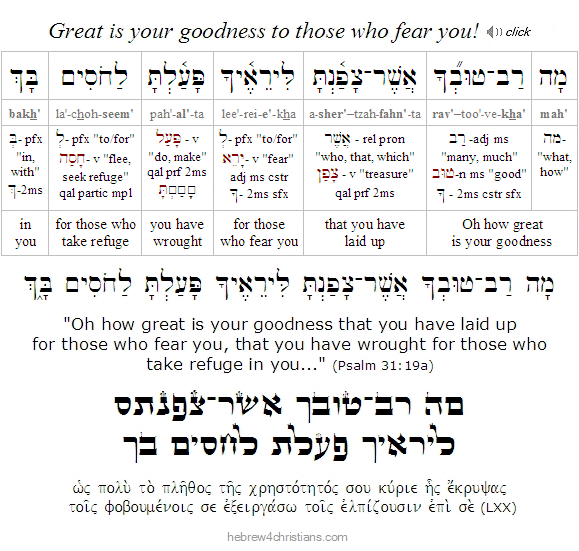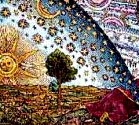|
Since we are required to both affirm and to trust that "all things work together for good" (Rom. 8:28), we must bless God for perceived evil as well as for perceived good, since all circumstances of life come from the hand of the LORD our God (Job 2:10). Despite appearances that sometimes seem to the contrary, we believe that the all-powerful, supreme LORD has not abandoned the world but actively sustains and upholds it with benevolent intent (Heb. 1:3). "We walk by faith and not by sight" (2 Cor. 5:7). When bad things happen to the righteous, we trust in God's personal care for their ultimate good, despite their present troubles. As the prophet Job said: "Though he slay me, I will trust in Him" (Job 13:15). This is the heart behind the Kaddish, the mourner's prayer, that expresses acceptance of God's world, despite the pain, sorrow, loss, and so on.
The term hashgachah pratit (ūöū®ūüūÆūŚūö ūżū©ūśūÖū¬) refers to God's personal supervision of our lives (hashgachah means "supervision," and pratit means "individual" or "particular"). Since He is the Master of the Universe, God's supervision reaches to the smallest of details of creation - from subatomic particles to the great motions of the cosmos. God not only calls each star by its own name (Psalm 147:4), but knows each particular lily and sparrow (Matt. 6:28-30, 10:29). Each person created in the likeness of God is therefore under the direct, personal supervision of God Himself -- whether that soul is conscious of that fact or not. As Yeshua said, even the hairs on your head are all numbered (Matt. 10:30). Indeed, the God of Israel is called ūÉū£ūöūÖ ūöū©ūĢų╝ūŚū¬ ū£ūøū£ųŠūæų╝ū®ūéū© / Elohei ha-ruchot lekhol-basar: "The God of the spirits of all flesh" (Num. 16:22), and that means He is LORD even over those who vainly attempt to suppress His Presence and reality. "Can a man hide himself in secret places so that I cannot see him? declares the LORD. Do I not fill heaven and earth?" (Jer. 23:24).
The Talmud says that when Moses asked God, "Please show me your glory" (Exod. 33:18), he was asking for God's vindication in the light of the gnawing question: "Why do the righteous suffer while the wicked prosper?" Moses was not given an explicit answer, and some of the sages said he wrote the enigmatic Book of Job to demonstrate that the question can only be reduced to God's inscrutable will: "Where were you when I laid the earth's foundation?" (Job 38:4). In other words, the question can only be answered by the One who knows the beginning from the end, the Infinite One who sees the implications and concatenation of all things. As finite beings, we see only a fraction of the big picture, and therefore we must yield our trust to the Wisdom and Power of Almighty God (Deut. 32:4).
It is written, "Your eyes saw me when I was inside the womb; in your scroll everything was written, my days were ordained before they came into existence" (Psalm 139:16). In light of God's providential ordering of our lives, Blaise Pascal asked, "What is left for us but to unite our will to that of God himself, to will in him, with him, and for him the thing that he has eternally willed in us and for us." The Mishnah says it this way: "Do His will as if it was your will that He may do your will as if it was His will" (Avot 2:4). In other words, what else can we do but learn to trust, accept, and to say "yes" to life -- even if at times we may feel like orphans, lost in a fatherless world... All our days are recorded in God's scroll.
Hebrew Lesson:
Psalm 139:16b reading (click):
 |
There is a dark temptation to refuse to accept God's sovereign will, which includes objecting to his "tolerance" of evil (for a season) until his greater plan for the redemption is fully manifest... We need to be careful lest we become hardhearted, bitter, and despair over the purpose for life - like Ivan in The Brother's Karamazov (Dostoevsky) who, though he intellectually gave assent to God's providential plan, refused to accept it because of the unspeakable cruelty and senseless suffering he saw in the world. His disillusionment moved him to say to his sincerely devout brother: "It's not God that I don't accept, Alyosha, only I most respectfully return him the ticket." How tragic that the heart can turn away from God because the present moment seems incomprehensible and broken.... How many people have so despaired when, if they had but held on for awhile longer, they may have received solace and comfort... For me it helps to remain humble, to confess my ignorance of much, and to "remember the future" wherein glory and beauty will be soon be revealed (Psalm 31:19).
Hebrew Lesson
Psalm 31:19a reading (click):
 |
For more on this, see the meditation entitled "Paradox and Presence."
|



